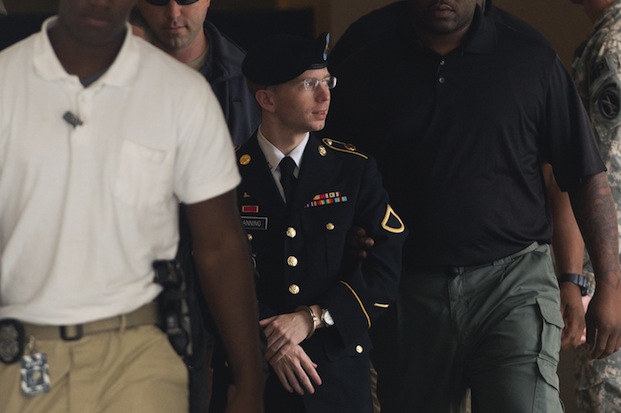I have been puzzling about why the United States authorities ever thought that Bradley Manning, who was jailed last week for 35 years for leaking military secrets on an unprecedented scale, was a suitable person to join the army. His size alone might seem to be an impediment to effective military service, for he is only five feet, two inches tall and weights 105lbs (7.5 stone). But his stature, though tiny, nevertheless comes within the army’s prescribed limits. He would have had to be two inches shorter and a stone lighter to have been rejected on grounds of size or weight. (If he had weighed over ten stone, he would have been rejected as obese.)
But being the wrong size is only one in an absurdly long and detailed list of official reasons for an applicant’s rejection by the army. This list consists mainly of physical ailments or conditions, all of which Manning must have passed. Even though he has now proclaimed himself to be a woman, and changed his name from Bradley to Chelsea (like Bill and Hillary Clinton’s daughter), he does not suffer from an ‘absence of both testicles’ or the ‘unexplained absence of a testicle’; for if he did, the army would have sent him packing.
There are, however, certain psychological characteristics that the army might have seen as obstacles to Manning’s recruitment. The reasons for rejection of applicants to join the US military include ‘transsexualism, exhibitionism, transvestism, voyeurism, and other paraphilias’, and ‘symptoms of behaviour of a repeated nature that impaired social, school, or work efficiency’. If a transsexual means, as the Oxford Dictionary says it does, ‘a person who emotionally and psychologically feels that they belong to the opposite sex’, Manning certainly is one. In his statement last week announcing his femininity, he (she) said: ‘I am Chelsea Manning. I am female. Given the way that I feel, and have felt since childhood, I want to begin hormone therapy as soon as possible.’ (He will be lucky if he [she] gets this in his military prison. ‘The army does not provide hormone therapy or sex-reassignment surgery for gender identity disorder,’ said a spokesman drily.)
Manning’s transsexualism might not have been apparent to the recruiting officer at the time of his enlistment in 2007, for he was then an openly gay man. He had, however, shared his anxieties about his sexual identity with other people. So what is the point of America’s mass electronic surveillance, as revealed by Edward Snowden, if it doesn’t use it to check the suitability for military service of odd coves like Manning? And if transsexualism is considered incompatible with soldiering, why was Manning allowed to stay in the army after he emailed his sergeant, attaching a picture of himself in a wig and women’s clothes, calling himself ‘Breanna’, and saying that he had hoped that a military career would ‘get rid’ of his gender identity disorder?
With regard to ‘symptoms of behaviour’ that impair ‘social, school or work efficiency’, Manning did well at school, excelling at science and computers, but he was socially very strange and inept, probably as a result of a miserable childhood spent with an alcoholic mother who drank rum or vodka all day and went on feeding him baby food long after he had stopped being a baby. He was lonely, depressed, bullied at school and given to emotional outbursts. He was bullied in the army, too; for, as a fellow soldier told the Guardian, ‘The kid was barely five foot…He was a runt, so pick on him. He’s crazy, pick on him. He’s a faggot, pick on him. The guy took it from every side. He couldn’t please anyone.’
Despite a decision, subsequently revoked, to discharge him from the army, Manning was sent off instead to train as an intelligence analyst, given top security clearance, and posted to Iraq, where he had access to hundreds of thousands of secret government messages, which he proceeded to leak to Julian Assange. The army later revealed that two of his military superiors had doubted the wisdom of sending him to Iraq, seeing him as a security risk; but given a shortage of intelligence analysts, he was sent all the same. Herein lies a paradox. For its ever-expanding intelligence-gathering programmes, the United States needs to employ more and more computer experts. But the greatest expertise comes to those who spend most of their time with computers, and such people can often be lonely, anti-social and disgruntled: potential whistleblowers, in other words.
Got something to add? Join the discussion and comment below.
Get 10 issues for just $10
Subscribe to The Spectator Australia today for the next 10 magazine issues, plus full online access, for just $10.
You might disagree with half of it, but you’ll enjoy reading all of it. Try your first month for free, then just $2 a week for the remainder of your first year.













Comments
Don't miss out
Join the conversation with other Spectator Australia readers. Subscribe to leave a comment.
SUBSCRIBEAlready a subscriber? Log in